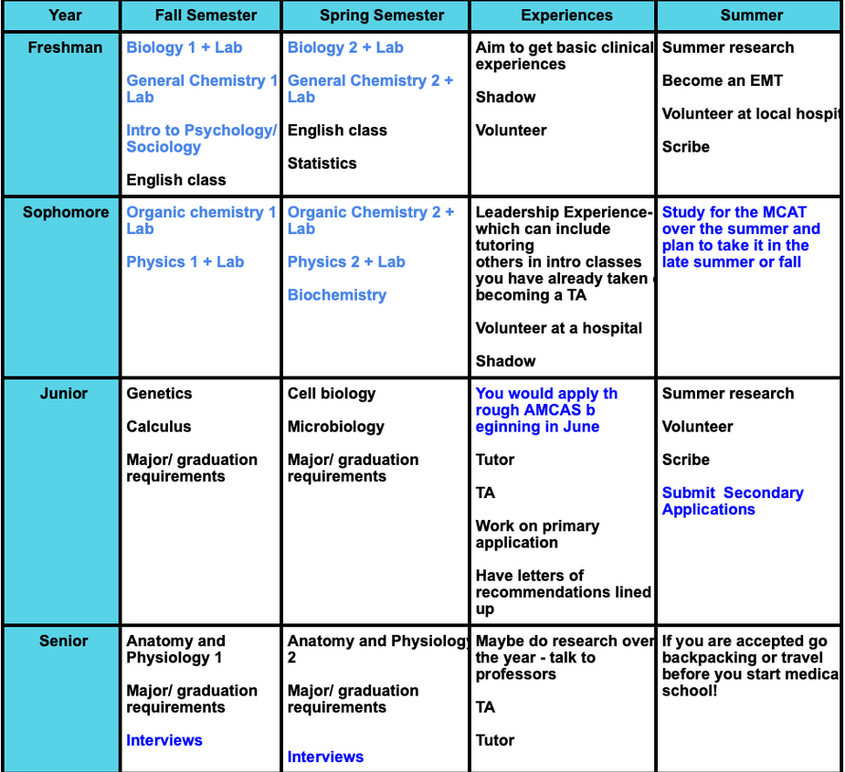Public Health and Nutrition classes DO NOT count towards your BCPM GPA – only introductory classes or upper level classes in Bio, Chem, Physics, and Math
Pro Tip

PREPARING
FOR THE
APPLICATION PROCESS
Coursework & MCAT
Deep Dive into Coursework
Coursework is a huge component in applying to medical school. As a pre-med, you can major in anything you like even though most major in the Sciences due to the overlap. Your ultimate goal is to pick a subject that you are excited about learning!
The pre-medical requirements include*
-
The core Science/Math courses in the BCPM
-
One semester of English
-
One semester of Introduction to Psychology or Sociology
*Requirements vary by school. Check the website of medical schools you are interested to learn more.
From a Medical School Admission Committee standpoint, there are two Academic Indicators: Overall GPA and the BCPM.
Overall GPA
The Overall GPA includes all courses from an accredited university. You have to take an online class or a class at a different university, make sure the credit is transferable. Additionally, when you are at the application stage, some medical schools may not accept online classes and/or classes at community colleges. Double check with the schools you are applying to on MSAR (which is a database that has all medical schools and their requirements).
BCPM
The BCPM (Biology, Chemistry, Physics, and Math) is the GPA for the math and sciences. According to the Medical School Admission Committees, this is weighed as more important since this is the GPA that constitutes your core science pre-medical requirements

Additionally, the BCPM includes all upper-level courses that are categorized as Math or Science. Public Health and Nutritional Sciences usually do not count unless your advisors tell you otherwise. This may seem stressful; however, the positive with the BCPM is that it is still a GPA (grade point average), meaning the grade you receive in each course has less weight with more courses taken. That is why if you get a bad grade, it's not the end of the world because you can always take more Science and Math courses!!
MOCK SCHEDULES
We have provided potential schedules for three kinds of situations: taking no gap years, take one gap year, and taking two. There is no right way to do this! The main goal is doing the best you can in your specific situation.
Within these schedules, we organized when to take classes, when to start studying for your MCAT, and how to trickle in your essential opportunities.
MCAT
Medical College Admissions Test
MCAT is a 7.5 hour multiple-choice, computer-based, standardized exam that tests physical and biological sciences, verbal reasoning, and writing skills through 4 sections:
-
Chemical and Physical Foundations of Systems
-
Critical Analysis and Reasoning Skills
-
Biological and Biochemical Foundations of Living Systems
-
Psychological, Social, and Biological Foundations of Behavior
It is required for medical school admission and committees look at your score, along with your grades and supporting materials, to evaluate your foundations to build a successful medical career.
Scoring
Each section is scored between 118 to 132. The four sections are added up to equal a score between 472 to 528 with an average of 500. Scores are usually released about a month or just over a month from each test dates. The score is usually given back a month or so after exam date.

The Breakdown
Sign-Up FAQ
When is it offered?
The exam is administered 15 times per year from January to September. It is highly recommended that you register for your MCAT test date early so you can select your first-choice location, date, and time. Seats tend to fill quickly.
How many times can it be taken?
The MCAT can only be taken three times in a single year, four times max in two years, and seven times in a lifetime. When registering, you can only be registered one spot at a time even if you void your score.
What is the cost?
The cost to take the MCAT is $320 during AAMC’s regular registration window, but increases if you register late or if you reschedule.
There are also cancellation and international fees that may pertain to some test takers. Remember another cost to keep in mind is the AAMC official MCAT prep materials which are essential for your last month before your MCAT.
Click here to learn more about the Fee Assistance Program.







